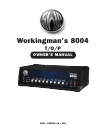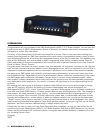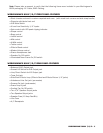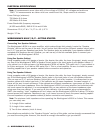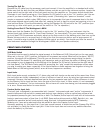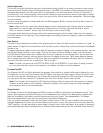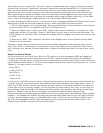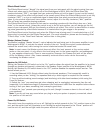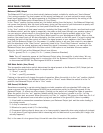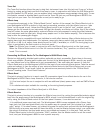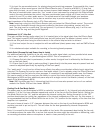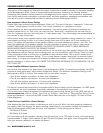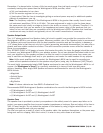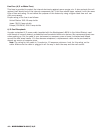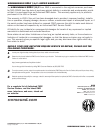
WORKINGMAN’S 8004 T/O/P • 11
2. An input for pre-recorded music, for playing along and practicing purposes. To accomplish this, insert
a CD player or other sound source into the Effects Receive jack. (It must be a MONO 1/4" plug that
goes into this input, so you’ll have to use a stereo-to-mono cable adapter of some kind.) You can adjust
the level of recorded music versus the “live” sound of your instrument by using both the Effects Blend
control (the more clockwise the control, the more pre-recorded music signal you’ll hear) and the volume
control of your CD (or other) audio source. The mixed sound will be heard through your speakers.
Besides pre-recorded music, this is also an excellent way to practice along with a drum machine.
Input impedance of the Receive jack is 27k Ohms minimum.
Note: Inserting a plug into the Effects Receive jack activates the Effects Blend control. The control
receives this command through the ground created by the phone plug making contact with the
jack. The plug must be a mono plug (tip and ground). If you have a stereo plug only, it will be nec-
essary to tie the ring and the ground together.
Unbalanced (1/4") Line Out
This jack provides another audio output, but it is located later in the signal chain than the Effects Send
jack. This signal is post-EQ AND post-effects loop, but still before (pre) the Master (volume) control. You
should use this jack when using an effects device in the effects loop and wish to achieve:
1. A line level output for use in conjunction with an additional (slave) power amp—such as SWR’s Power
750.
2. An unbalanced output suitable for recording or live mixing board purposes.
Patch Point (Preamp Out and Power Amp In Jacks)
For additional patching flexibility at the very end of the audio signal chain, we have provided what some
refer to as a “patch point” on your Workingman’s 8004. This is comprised of:
1. A Preamp Out jack that is post-master (in other words, its signal level is affected by the Master con-
trol on the front panel)
2. A Power Amp In jack that is post-everything (it goes directly into the power amp at a preset level and
cannot be adjusted specifically by anything on the front panel)
The “patch point” circuit can be utilized as an effects loop after your side-chain effects loop’s signal has
returned. The Preamp Out can be used as a final audio output if you’re already using the Effects Send and
the Unbalanced Line Out jacks for other purposes. If connected to an additional power amp, the Preamp
Out can be useful in that you now have the ability to control the levels of both the power amp in your
Workingman’s 8004 and your additional power amp with a single control: the Master (volume) on the front
panel of the Workingman’s 8004.
Note: SWR loyalists may find it interesting that this circuit was also present on two of our earliest
models: the Studio 220 and the classic SM-400.
Cooling Fan & Fan Mode Switch
The power amp in your Workingman’s 8004 is cooled by two methods: 1) An (internal) extruded aluminum
heatsink; 2) A fan. You have complete operational control of the fan via the Fan Mode Switch. Setting the
Fan Mode Switch to the “On” position activates the internal cooling fan. Setting the switch to the “Off”
position deactivates the cooling fan, regardless of the internal temperature of the unit. For this reason, it
is recommended that the Fan Mode Switch be set to the “On” position for the majority of the time that the
amplifier is in operation.
Be sure to leave at least a 1/2" clearance between the vent on the top of your Workingman’s 8004 and
anything you wish to put on top of it. This will allow for the heat generated by internal components
to escape.
Note: It is normal for the cooling fan to be audible at low levels. We recommend deactivating the fan only
in situations where the noise floor is so low that normal fan noise might be noticeable or distracting, such
as recording situations where a microphone is used in close proximity to the unit.



